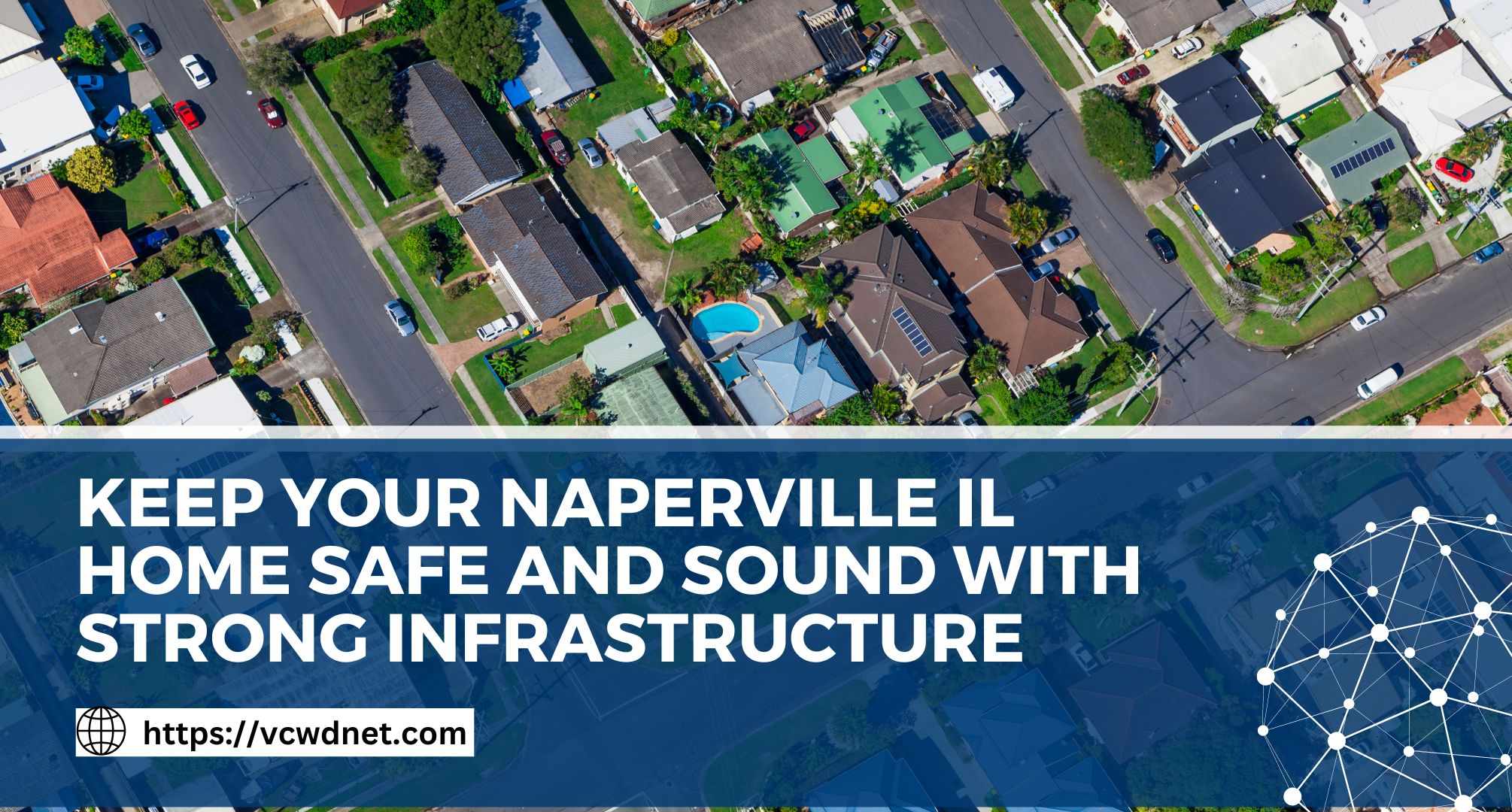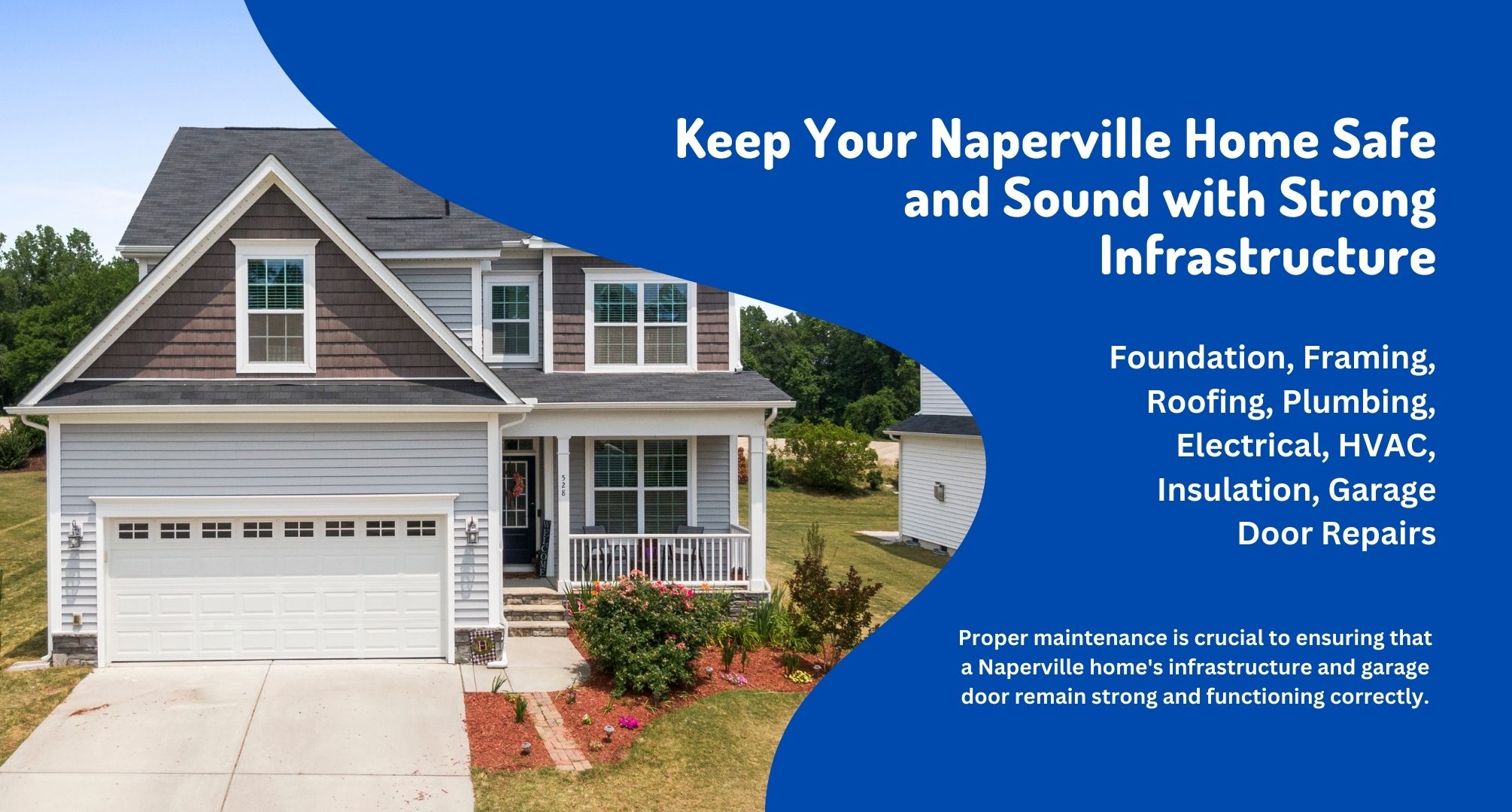Building regulations in Naperville, Illinois ensure that all homes in the city are safe, comfy, and healthy to live in. The necessity for strong infrastructure in homes is a critical aspect of these regulations. For several reasons, strong infrastructure is essential in Naperville homes.

A solid infrastructure ensures the occupants’ safety. Homes with faulty or weak infrastructure are more likely to collapse, injuring people or even fatalities. Builders and homeowners can ensure the safety of their occupants by constructing homes with strong infrastructure.
Weak infrastructure can deteriorate over time, resulting in issues such as water damage, base cracks, and mold growth. These issues can jeopardize the structural stability of the home, necessitating expensive repairs or even a total rebuild. Find significant, on the other hand, can endure the test of time and provide a dependable, long-term residence.
Air leaks, drafts, and ineffective heating and cooling systems are common in homes with poor infrastructure, which can result in greater energy bills. Homeowners can reduce their energy usage and save money on utilities by building homes with good infrastructure and using energy-efficient materials and systems.
Naperville’s building codes require a solid infrastructure. The city has strict building and maintenance standards, including prerequisites for building materials, foundation strength, and structural stability. Builders and homeowners could indeed ensure compliance and avoid penalties by adhering to these regulations and building housing with strong infrastructure.
In conclusion, strong infrastructure is essential for Naperville homes for safety, durability, energy efficiency, and conformance with building codes. To ensure that all homes in the city are safe and secure for their occupants, property owners and builders must take priority infrastructure repair and construction.
Infrastructure types in a typical Naperville home
A typical Naperville home contains various types of facilities that are required for proper operation and overall comfort. These are some examples:
The foundation is the foundation on which the entire house is built. It is generally constructed from concrete and provides to support and distribute the weight of the house evenly from across ground.
- Framing is the structure that holds the mass of the walls, roof, and floors. It is typically constructed from timber or steel and serves as the foundation for the rest of the house.
- Roofing – The roofing is the home’s outermost layer, protecting it from the elements. It is generally made of shingles, tiles, or metal and is intended to be watertight.
- Drainage system is the system of pipes, valves, and fixtures in the home that distribute water and remove waste. The whole thing from the water supply and the water heater to the shower and bathroom is included.
- Electrical infrastructure consists of the wiring, outlets, switches, and circuit breakers that power the house. Lighting, appliances, and other electronic devices require it.
- HVAC infrastructure consists of the furnace, air – conditioners, ductwork, and vents that govern the temperature as well as the air quality of the home.
- Insulation is the material used to keep a residence warm in the winter and cool in the summer. It is commonly made of fiberglass, organic matter, or foam and is used in the construction of walls, floors, and ceilings.
These are just a few of the important types of infrastructure that can be found in a typical Naperville home. Placement, maintenance, and repair of these systems are critical to ensuring the comfort, safety, and longevity of the home.
Proper maintenance is critical to ensuring that the infrastructure and garage door of a Naperville home remain strong and functional. Here are some pointers to help you maintain these essential parts of your home:
Regular inspections of your home’s infrastructure and garage door can help detect problems early and save you money on future repairs. Schedule an annual professional inspection to recognize any potential issues.

Tips for Maintaining a Strong Infrastructure and a Garage Door
- Address Issues Promptly – If you notice any problems with your home’s facilities or garage door, such as foundation cracks or strange noises when going to open and closing the door, address them as soon as possible. Ignoring these issues may lead to more serious problems in the future.
- Keep Them Clean – Keeping the infrastructure of your home and garage door clean can help prevent damage from dirt, debris, and pests. Clean gutters, downspouts, and garage tracks on a regular basis to avoid clogs and buildup.
- Lubrication – Proper lubrication of machine components can prevent premature wear and tear while also extending the life of your home’s infrastructure and garage door. For best results, use a high-quality lubricant recommended by the manufacturer.
- Consider changing your home’s infrastructure and garage door to more energy-efficient models. This can save you money on utilities while also lowering your carbon footprint.
- Hire Professionals – It is best to hire professionals for complex infrastructure projects or garage door in Naperville IL . They have the knowledge and tools required to complete the job safely and efficiently.
You can help make sure that your Naperville apartment’s infrastructure and garage door remain strong and functional for years to come by following these maintenance tips. Regular maintenance can also assist you in preventing costly repairs while also ensuring your home’s safety and comfort.
Infrastructure Protection During Extreme Weather Conditions
Extreme weather events are common in Naperville, Illinois, ranging from heavy snows in the winter to severe thunderstorms and tornadoes in the summer. The above weather events can cause significant damage to a home’s infrastructure. Here are some pointers for safeguarding your home’s infrastructure during severe weather:
Check Your Home’s Drainage System – Make sure your gutters, downspouts, and proper drainage are clear of debris and working properly. This will aid in the prevention of flood damage and flash floods during periods of heavy rain or snowfall.
Inspect Your Roof – Inspect your roof on a regular basis for signs of damage, such as broken or missing shingles. Repair any problems as soon as possible to avoid water damage.
Safeguard Loose Objects – High winds may cause loose objects to become projectiles, causing structural damage to your home. Before a storm, secure outdoor furniture, grills, and other loose objects.
Trim Trees and Branches – During high winds, trees and branches can do major harm to your home’s infrastructure. Trim trees as well as branches near your home on a regular basis to avoid damage.
Install Storm Shutters – During severe weather events, storm shutters can help protect your home’s windows. They are particularly important in tornado-prone areas.
Consider purchasing a backup generator. Power failures are common during severe storms. Consider installing a backup generator to maintain your home’s infrastructure operational in the event of a power outage.
Local Weather Alerts – Stay up to date on local weather alerts and warnings. Prepare a plan for evicting your home if needed.
By taking these precautions, you can help to protect your home’s infrastructure during severe weather. Routine maintenance and preparedness can also save you from costly repairs while also ensuring your home’s safety and comfort.